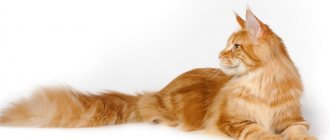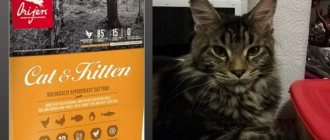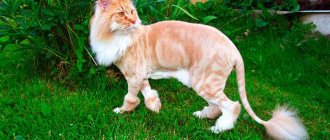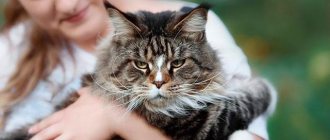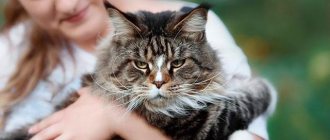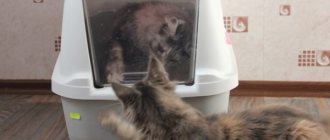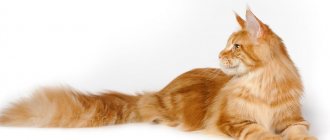Myths and truth about hypoallergenicity
According to statistics, 15% of cat owners are susceptible to allergies. Enterprising breeders take advantage of this situation. From time to time they declare a certain breed of cat hypoallergenic.
Their main goal is to make a profit. After all, any cat lover with allergies is willing to pay more for a cat that will not cause a negative reaction in him.
The main allergen is pet fur and fluff, so “hairless” breeds are declared safe. Also, cats with dense and short hair are sometimes classified as hypoallergenic breeds. This category also includes cats that shed little or have no undercoat.
Important! There are no “hypoallergenic” cat breeds. Moreover, breeders are unlikely to have the opportunity to develop such a breed.
Maine Coons are not included in the list of hypoallergenic breeds. They have fluffy and long fur that needs to be brushed regularly. It poses a real danger to people with allergies.
The fur and fluff of a Maine Coon's undercoat does not in itself cause a reaction. The immune system of an allergic person reacts to a specific protein, FelD1. It is found in all secretions of the cat's body:
- saliva;
- urine, feces;
- secretions of the sweat and sebaceous glands;
- cat vaginal discharge;
- dandruff – dead skin particles.
A cat spreads FelD1 throughout its body during licking. In this case, wool is both a “transport” (the allergen spreads through it) and a “reservoir” (accumulates it).
Important! Maine Coon allergies are not uncommon.
Both hairless and short-haired cats can be allergenic, because they also regularly “wash themselves” with their tongues. The protein that provokes allergies can remain in the air for a long time and settle on furniture upholstery, curtains, and carpets. A cat's litter box is also a danger zone.
Interesting! Felinologists and researchers continue to try to breed a cat breed with a blocked mechanism for producing the FelD1 protein. Currently under development are foods containing substances that bind protein in the cat’s body.
Claims about the existence of hypoallergenic cat breeds are a marketing ploy. However, some individuals produce reduced amounts of the allergen.
Children's reaction to cats
The child’s immune system is not yet formed, so they often outgrow specific manifestations. At the first signs, doctors recommend removing the coon from the apartment and preventing children from having contact with it.
Useful to read: Who will grow up from a cross between a Maine Coon and an ordinary cat?
To find out the true causes of allergies, it is necessary to undergo a full examination in the form of tests for irritants. In a fairly large number of cases, it turns out that the coon is not dangerous to health. This can be shown either by observation or laboratory tests.
Usually wool only causes redness, like dust, and blooms. Daily wet cleaning, absence of pile carpets and medicinal support prescribed by a doctor will help.
It is believed that sterility is not a panacea; in addition, in such conditions, children are more susceptible to developing allergies to Maine Coons or other irritants. If you are in good health, it is not advisable to limit communication with your cat; the immune system gets used to foreign substances and does not react to them belligerently.
Unfortunately, allergies are individual and have a cumulative nature of action. That is, in some cases, the Maine Coon manages to fully grow, and only then problems arise.
The coat of representatives of this American breed is thick, but soft and with undercoat. Therefore, the Coon rarely provokes irritation due to hairs or fluff. If a person is prone to allergic manifestations, wool can still cause an asthma attack.
How to recognize the first signs of allergies
The symptoms of an allergic reaction to a Maine Coon are quite specific. They are similar to the manifestations of a cold, bronchitis or any skin disease.
If the FelD1 protein enters the body, the following symptoms may occur:
- runny nose: swelling of the mucous membrane of the nasal passages, copious mucus secretion, difficulty in nasal breathing;
- sore throat, cough, shortness of breath;
- asthmatic attack.
When an allergen enters the body through scratches and bites, the following symptoms occur:
- irritation and redness of the mucous membranes of the eyes, lacrimation, swelling of the eyelids;
- itchy skin rash – urticaria;
- redness and swelling of the skin around the scratch;
- anaphylactic shock.
Anaphylactic shock is an extremely dangerous condition. It develops “hurricaneously” - suffocation occurs in a matter of seconds, then loss of consciousness. AS is possible only with repeated contact with the allergy pathogen. If you have already had a reaction to a Maine Coon, then in future a person should avoid cats of this breed.
Maine Coon allergy
Only registered users have the ability to start new topics. Register and log in to the site by entering your username and password on the right side of the window, and you can start a new topic.
Before visiting the forum, read the topic: “How to properly consult a veterinarian,” as well as the list of answers to frequently asked questions, this will help you save your time and get an answer to your question faster. Pay special attention to the document: Symptoms of animal diseases. Perhaps in your situation you cannot expect an answer on the forum, but you need to urgently call a doctor or take the animal to a veterinary clinic!
Before joining the forum, read the following sections, this will help save your time and quickly get an answer to your question:
Attention! Pay special attention to the document “Symptoms of Animal Diseases”. Perhaps in your situation you cannot expect an answer on the forum, but you need to urgently call a doctor or take the animal to a veterinary clinic!
Before joining the forum, read the following sections, this will help save your time and quickly get an answer to your question:
Give or keep a pet
Often a person finds out about his allergies when a cat appears in the house. You can agree with the manufacturer on a return in the event of force majeure. This is why there is a purchase and sale agreement: the buyer will get their money back, and the cat will find a new owner.
It happens that allergies make themselves felt after a long time. The cat grows up and becomes everyone's favorite and the pride of the family. And then one of the family members develops an allergy.
Most often, the problem is solved radically - the question arises of getting rid of the pet. A purebred cat, especially one like a Maine Coon, has a fairly high chance of ending up in good hands. The separation will be difficult for household members, but it can be survived.
There is another solution to this problem. It is acceptable if the allergy symptoms are not too severe.
First you need to make sure that the Maine Coon is the cause of the allergy. Perhaps an undesirable reaction was caused by a new washing powder or shampoo or cosmetics. A food allergy or reaction to house dust cannot be ruled out. There are many reasons - it is better to eliminate them one by one in time.
If, after thoroughly cleaning the house and checking all potential allergens, the alarming symptoms do not go away, you should consult an allergist. The specialist will conduct an irritant test, which will identify the allergy risk factor.
If the cause turns out to be a Maine Coon, there is a solution to the problem: you can take antihistamines. Over time, the allergy may weaken until it disappears completely.
Care
The breed requires specific care, which is related to the choice of food, the characteristics of the cat’s activity and its size.
- Food. The animal's diet must be balanced (preferably special feed, vitamins, supplements from vegetables, fruits, and dairy products). The bowl is large and durable.
- Personal space. Big cats need a large place to sleep and rest.
- Activity. You need to play with the animal, take a walk, and encourage his love for physical exercise.
- Purity. Maine Coons are calm about water and love to swim. But doing this is often not recommended. A couple of times a month or before exhibitions is enough.
- Nails. They are cut every 2 - 3 weeks using special scissors.
- Eyes and ears. The eyes are wiped with cotton pads soaked in a light tea solution, the ears are carefully cleaned with cotton swabs.
- Wool. The Maine Coon needs frequent brushing, especially during the shedding season.
- Health . From 2 months, kittens are vaccinated and treated against fleas and worms (this is done throughout their lives).
When bathing, be careful not to let water get into your ears.
Prevention and risk minimization
The love for animals and the desire to acquire a pet can be so strong that a person is ready to neglect possible unpleasant consequences. But to minimize the risk of allergies to long-haired Maine Coons, you should follow some useful rules:
- It is best to purchase not an adult cat, but a kitten. Babies produce a minimal amount of allergenic protein. Therefore, the risk of developing attacks in people with allergies is also small. Subsequently, addiction is possible, and there will simply be no manifestations of the disease.
- You should not adopt a Maine Coon kitten during the allergy season (spring and autumn).
- It is believed that Maine Coon cats are more likely to cause allergies than male cats.
- The correct decision in all respects is to spay or neuter your pet. In these cats, FelD1 production is greatly reduced.
- You should inspect your home and get rid of everything that could be a source of allergies. It is recommended to remove fluffy carpets, fluffy bedspreads, and soft toys from the apartment. All surfaces should be easy to clean and wash. It is better to replace feather and down pillows with modern ones with hypoallergenic filling. All suspect chemicals must be removed from the home. Check the kitchen and bathroom for black mold.
- Buy an air purifier and humidifier.
- Frequent ventilation is a reliable measure. But it is important to remember that Maine Coons are afraid of drafts.
- Frequently carry out wet cleaning with thorough wiping of all surfaces.
Important! Light-colored Maine Coons are less dangerous for those who are allergic to cats.
People with allergies should follow these recommendations:
- At first, limit the time you spend interacting with your Maine Coon baby. If there are no alarming symptoms, you can gradually increase the duration of the “date.”
- It is strictly forbidden to kiss or bring your pet close to your face, or allow it to lick your face and hands.
- Be sure to wash your hands and rinse your face after handling the kitten.
- Do not allow the Maine Coon to sleep on the bed or lie on clothes.
- Showering and washing your hair daily alleviates the condition and prevents the development of allergies.
It is better to entrust caring for a Maine Coon to those family members who are not susceptible to the disease:
- It is necessary to carefully monitor your pet's health: some cat diseases provoke increased production of allergen protein.
- Use high-quality litter for the litter box and clean the toilet daily. The Maine Coon has shaggy paws; after visiting the litter box, you need to wipe them with a soft, damp cloth.
- The cat will have to be brushed almost every day. Wash – once every 2 weeks. Daily wiping of the Maine Coon's coat with damp, clean wipes will help.
- Wash and clean your cat's bed and toys as often as possible.
Antihistamines, which should be prescribed by an allergist, will help cope with allergy symptoms. The following medications can be used as first aid:
- for skin itching, non-hormonal creams and ointments will help: Ketocil, Dermadrin, Psilobalm, Fenistil-gel;
- for rhinitis-like conditions (stuffiness, nasal discharge): Nazivin, Aqua-Maris, Dolphin, Allergol;
- Eye irritation will be relieved by Kromhexal, Histimed, Dexamethasone;
- sorbents will absorb and remove allergens from the body: Filtrum, Enterosgel, Smecta, Activated carbon.
These drugs should definitely be in any home medicine cabinet. Especially if there are people in the family who are prone to allergies.
There is no reason to consider the Maine Coon breed to be particularly allergenic. They are no more dangerous than the Sphinxes or the Britons. Any cat breed can cause allergies or be safe.
If preventive measures do not help, you will have to part with your pet or use medicinal methods to “reconcile” the body and the allergen. It's expensive, but quite effective. Everyone decides for themselves what decision to make. The main thing is that everyone is healthy and happy.
How to treat Maine Coon allergies
I was searching for. ALLERGY IN A MAINE COON HOW TO TREAT - I cured it myself! No doctors! Look at the forum about Maine Coon cats - Maine Coon - forum. The food was changed immediately, he only eats Royal canin SENSITIVITY control (dietary food for food allergies), before that he always ate food from the same company for coons. The Maine Coon breed does not suffer from food allergies, but it is best to avoid fatty foods. Why and how to treat diarrhea in Chihuahuas (1). 4 reasons why dogs don't like cats. The Maine Coon cat is naturally adapted to harsh climates. Such problems are treated with external antibiotics, additionally apply a bandage and fix the limb with a splint. Therefore, today we will talk about how to treat allergies in cats. Our question is for you. Which cat do you like best?
Maine Coon. British. Food allergies. Cats. Pets. Keeping pets - food, care, treatment of dogs, cats, birds. Section: Cats (We have a 1.3 g Maine Coon cat, neutered). How to treat allergies in a Maine Coon - NO MORE PROBLEM!
We recommend reading: Can You Get Worms From a Cat?
Food allergies. Maine Coons, like all cats, cause allergies if there is direct contact with them. A person predisposed to this condition will sooner or later feel unwell. Modern veterinarians quite often have to diagnose and subsequently treat allergies in Maine Coon cats, allergies can occur to the saliva of mosquitoes, fleas and other blood-sucking parasites Forum about Maine Coons HEALTH Health Allergies?
PDA. The only treatment is to exclude allergenic components from the diet. My allergy to other people’s cats went away after more than a dozen Maine Coons appeared in the house: until then, any cat show ended with H1 histamine receptor blockers (which is also not scary at all). Allergies are also caused by parasites inside the animal's body (worms). Regular preventative care will help your pet stay alert and healthy. How to choose a Maine Coon kitten. Maine Coon diseases. Coons are very sensitive to water hardness. Kidney stones can be caused by an incorrect ratio in the diet of fish and meat; there should be more meat; this is the basis of Maine Coon nutrition. Maine Coon allergies. Dear forum visitors!
Please remember that an answer on the forum does not replace an in-person examination. Maine Coon cat breed, age 2.5 years. This article will help you learn everything about Maine Coon illnesses and diseases, as well as how to treat and prevent them. He will conduct an examination, make a diagnosis and prescribe treatment. Allergies in Maine Coons. Who said that if a Maine Coon is sick, it is only due to its own, intrabreed sores?
No one is immune from urolithiasis, from common worms, or from allergies. But other diseases can be treated and cured Library of the forum for breeders and lovers of Maine Coon cats. How to treat allergies in a Maine Coon - 100 PERCENT!
But, unfortunately, it is not treated in all cases, since the owner believes that if the pet does not have fleas, then there cannot be an allergy. The indigenous Maine Coon breed was formed naturally, which had a beneficial effect on its health and hereditary characteristics. Maine Coon nursery Mister Coon decided to seriously look into this issue and find out the opinion of leading immunologists. Is it definitely an allergy and is it definitely an animal allergy?
Allergies in Maine Coons are specific and manifest themselves as a reaction to some substance, the amount of which does not matter much. The Maine Coon breed may be allergic to the saliva of insects such as mosquitoes and fleas.
Please remember that an answer on the forum does not replace an in-person examination. Maine Coon cat breed, age 2.5 years. This article will help you learn everything about Maine Coon illnesses and diseases, as well as how to treat and prevent them. He will conduct an examination, make a diagnosis and prescribe treatment. Allergies in Maine Coons. Who said that if a Maine Coon is sick, it is only due to its own, intrabreed sores?
Features of hypoallergenic animals
The allergen that affects humans is the Fel D1 protein, which is found in animals and waste products. With fur, saliva and then it enters the air, and from there into the host’s body. Hypoallergenic cats secrete this protein in smaller quantities, so a person feels comfortable around them. These cats are for allergy and asthma sufferers, they are allergen-free.
The same animal can have different effects on an allergic person. Some will feel comfortable being around an animal, while others will feel the onset of an allergic reaction from the very first seconds.
What breeds are considered hypoallergenic?
Canadian and Don Sphynxes
Before getting a pet, check out the list of hypoallergenic cats that are suitable for allergy sufferers. It includes cat breeds without undercoat and those that do not shed. They do not cause allergies in people. The top 10 hypoallergenic cat breeds are headed by Sphynx cats. These are cats to which there are no allergies, because they do not have hair. They are hardy and have good immunity, so they rarely get sick. The Sphinx is smart and agile, easily trained. The breed has 2 subspecies:
- Canadian Sphynx. Hairless cats are considered the oldest breed. Without wool, therefore allergen-free. There are many folds on the animal's body. The Canadian Sphynx can be plain or spotted. They have a long, pointed tail, round eyes, clearly defined cheekbones and wide-set ears. They are friendly and kind. They get along well with children. Active and playful. Loyal to the owner. Least aggressive.
- Don Sphynx. Animals that do not cause allergies. Their skin has more folds. Ears are set high. The eyes are narrow, elongated, and the gaze is menacing. Smart and loyal, but temperamental and touchy. The hair coat depends on the type of breed: Hairless - no hair, the animal is absolutely smooth.
- Flock - covered with straight and short hairs. They are thin and soft, almost invisible.
- Velor - hairs 2-3 mm.
- Brush - they have wool that is sparse and tough.
Behavior with other animals
Despite their attachment to their owner, love and devotion to him alone, Maine Coons get along well in the house with other animals. With both dogs and cats, they become playmates, but avoid creating unnecessary noise and other inconveniences. This is a delicate breed.
Children
Cats also get along well with children, even acting as nannies - keeping an eye on the child and keeping him busy. The only recommendation is not to leave very young children alone with cats, because Maine Coons can be jealous and do not like it when their self-esteem suffers. These are cats that will never, even in a fit of play or excitement, cause pain to a person. They are not vindictive.
